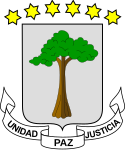
The politics of Equatorial Guinea take place in a framework of a presidential republic, whereby the President is both the head of state and head of government. Executive power is exercised by the government. Legislative power is vested in both the government and the Chamber of People's Representatives

Teodoro Obiang Nguema Mbasogo is an Equatoguinean politician, dictator, and former military officer who has served as the second president of Equatorial Guinea since 1982. Previously, he was the Chairman of the Supreme Military Council from 1979 to 1982. As of 2024, he is the second-longest consecutively serving current non-royal national leader in the world, behind Cameroon's Paul Biya.

The Democratic Party of Equatorial Guinea is the ruling political party in Equatorial Guinea. It was established by President Teodoro Obiang Nguema Mbasogo on 11 October 1987.

Convergence for Social Democracy is the opposition party in Equatorial Guinea. It was the only opposition party with parliamentary representation during 2013-2017.

Equatorial Guinea elects on the national level a head of state – the president – and a legislature. The president is elected for a seven-year term by the people. President Teodoro Obiang Nguema Mbasogo was re-elected unopposed on 15 December 2002. The Chamber of People's Representatives has 100 members, elected for a five-year term by proportional representation in multi-member constituencies.

Thomas Boni Yayi is a Beninese banker and politician who was the president of Benin from 2006 to 2016. He took office after winning the March 2006 presidential election and was re-elected to a second term in March 2011. He also served as the chairperson of the African Union from 29 January 2012 to 27 January 2013.

Cristino Seriche Bioko was an Equatoguinean soldier and politician who was the Prime Minister of Equatorial Guinea from 15 August 1982 to 4 March 1992. He previously served as Vice President under Teodoro Obiang Nguema Mbasogo for almost one year, from December 1981 to until the position was abolished in October 1982 according to the constitutional referendum, at which point he became president.

Presidential elections were held in Equatorial Guinea on 15 December 2002. Incumbent President Teodoro Obiang Nguema Mbasogo easily won another term amidst an opposition boycott.

Presidential elections were held in Equatorial Guinea on November 29, 2009. Teodoro Obiang Nguema, who has been President since 1979, ran for another term and won re-election with 95.8% of the vote, according to official results. Opposition leader Plácido Micó Abogo placed second with 3.6%. However, international observers and the main opposition candidate questioned the legitimacy of this election, noting the poor management which created an unfriendly field for other candidates to take part, media manipulation and the unbalanced results.
Plácido Micó Abogo is an Equatoguinean politician. He was Secretary-General of the Convergence for Social Democracy (CPDS), an opposition political party in Equatorial Guinea, from 1994 to 2013.

A constitutional referendum was held in Equatorial Guinea on 15 August 1982 following the overthrow and execution of Francisco Macías Nguema in the 1979 coup d'état. The new constitution replaced the 1973 document and appointed Teodoro Obiang Nguema Mbasogo president for seven years, as well as making provisions for the protection of human rights and limited political representation. It was passed by 96% of voters with a 93% turnout.

Presidential elections were held in Equatorial Guinea on 25 June 1989, the first since 1968, although incumbent Teodoro Obiang Nguema Mbasogo had his seven-year term starting in 1982 approved in a referendum in 1982. He was the only candidate and was re-elected unopposed with 99% of the vote.

Presidential elections were held in Equatorial Guinea on 25 February 1996. Although the country was no longer a one-party state, the elections were boycotted by the opposition, although their names remained on the ballot papers. As a result, the incumbent Teodoro Obiang Nguema Mbasogo won with 98% of the vote. Turnout was 80%.

A constitutional referendum was held in Equatorial Guinea on 13 November 2011. It allowed the incumbent President Teodoro Obiang Nguema Mbasogo to run for at least two more seven-year terms as well as establish the post of Vice-President, widely expected to be given to his son Teodoro Nguema Obiang Mangue in preparation of dynastic succession.

Equatorial Guinea–North Korea relations refers to the current and historical relationship between Equatorial Guinea and North Korea. While Equatorial Guinea has no representation in North Korea, it is one of few African states to have a North Korean embassy, located in the capital of Malabo.

General elections were held in Equatorial Guinea on 20 November 2022 to elect the President and members of Parliament, alongside local elections. Originally the parliamentary elections had been scheduled for November 2022 and presidential elections for 2023. However, in September 2022 Parliament approved a proposal to merge the elections due to economic constraints. The government announced on 26 November 2022 that Obiang had won the election by an overwhelming margin, as expected. It stated that provisional results showed him with 97% of the vote on a turnout of 98%. The elections were considered a sham by international observers.
Capital punishment, or death penalty, is no longer a legal punishment in Equatorial Guinea.

The 1982 Constitution of Equatorial Guinea was the country's third constitution. Following the 1979 military coup that removed Francisco Macías Nguema from the presidency, a popular referendum obtained 95.8% of votes in favor of the new Constitution in August 1982. The Constitution, which the United Nations helped draft, added provisions for human rights, outlined a new free-market economy for the country, and nominally restored national elections.
Events in the year 2024 in Equatorial Guinea.











